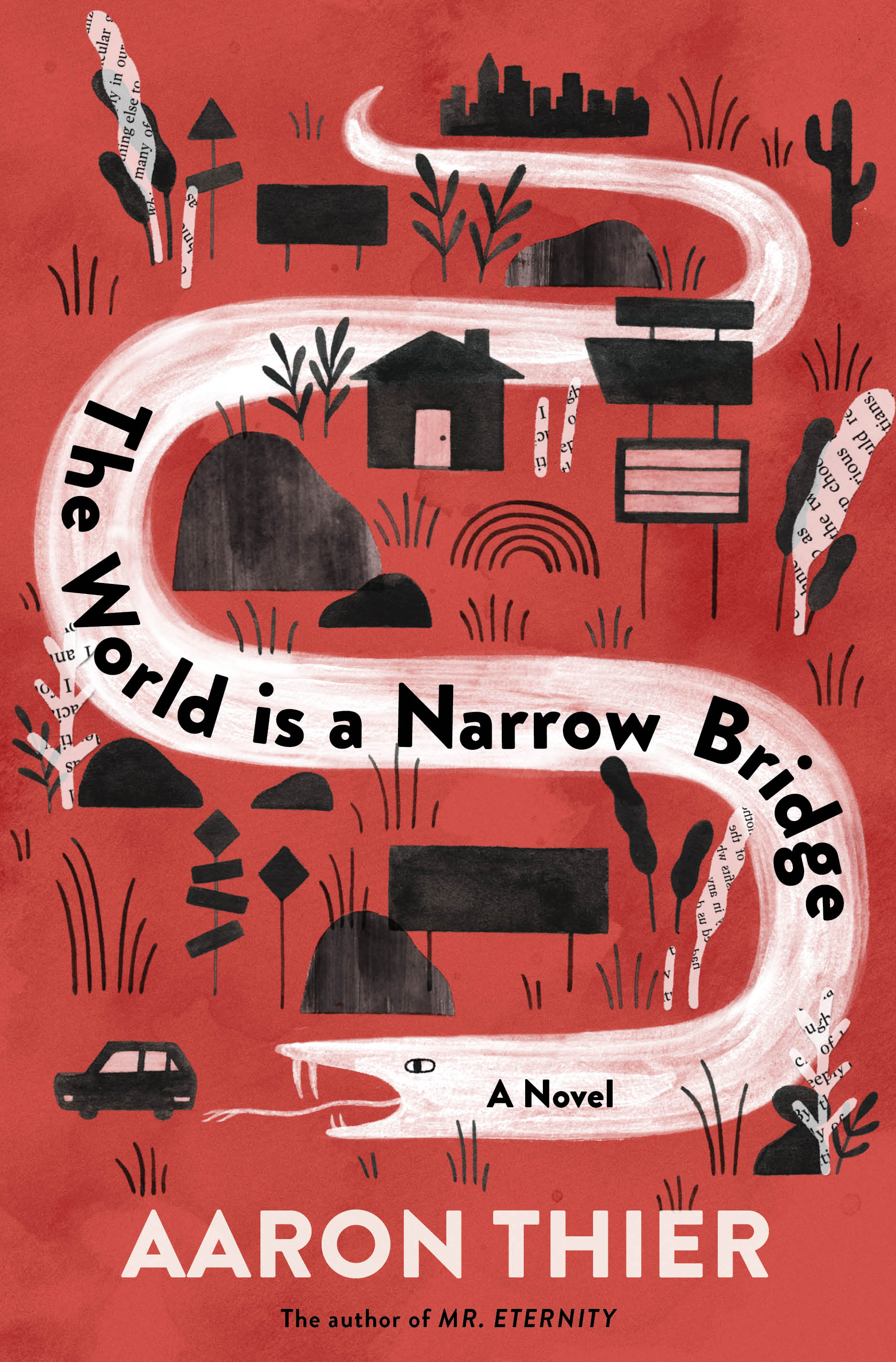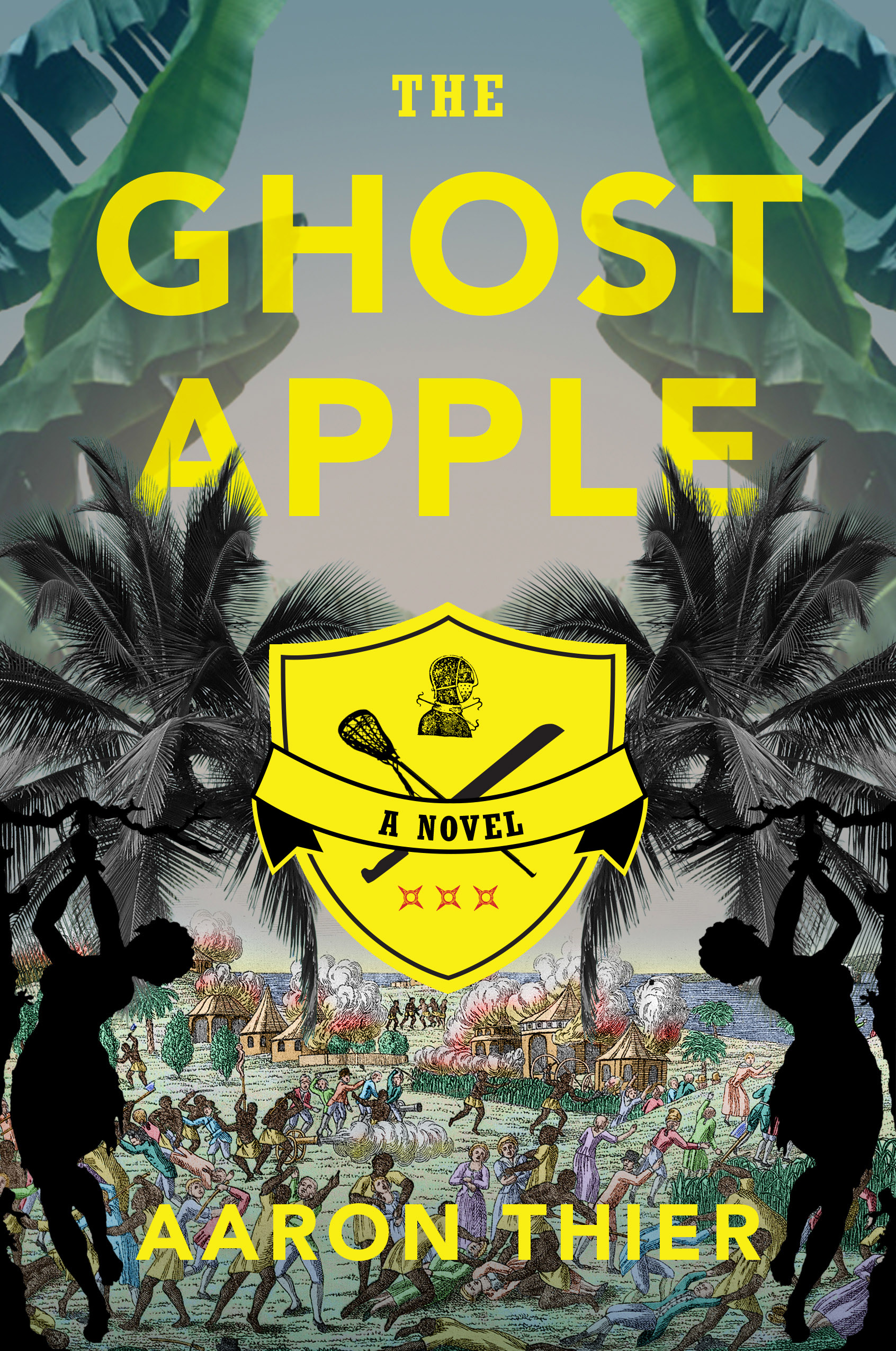Aaron Thier’s first novel, THE GHOST APPLE (a semifinalist for the 2015 Thurber Prize for American Humor) was published in 2014, with MR. ETERNITY (“…will be sizzling in my brain for a long time…”—Lauren Groff) following in 2015. A regular contributor to The Nation and Lucky Peach and a graduate of Yale University and the MFA program at The University of Florida, Thier received an NEA Fellowship in Creative Writing in 2016.
THE WORLD IS A NARROW BRIDGE
“[C]aptivating . . . [A] wonderfully zany new novel . . . told in ambitious floating paragraphs that cover an absurdist range of subject matter . . . its prose is powerful, filled with dread and compassion – a welcome surrealist take on Alexis de Tocque-ville.”
—Sharma Shields, New York Times Book Review
From the author of MR. ETERNITY, THE WORLD IS A NARROW BRIDGE is a darkly comic road novel about a pair of millennial parents-to-be on a divinely ordained mission. Miami couple Murphy and Eva have almost decided to have a baby, when Yahweh, the Old Testament God, appears to Eva and makes an unwelcome demand: He wants her to be his prophet. He also wants her to manage his social media presence.
Yahweh sends the two on a wild road trip across the country, making incomprehensible demands and mandating arcane rituals as they go. He wants them to build a temple on top of a Florida landfill, to endure a period of Biblical wandering in the deserts of the Southwest, and to mingle at a Montana “summer camp for billionaires.” Hurtling through a national landscape of political chaos and environmental doom, Murphy and Eva search their surroundings for signs of a future they can have faith in. They also find allies, including a half cat/half dog named Fluffy 2, a coterie of elites who mistakes them for North Carolina society people, and Satan himself. Equal parts hilarious and poignant, THE WORLD IS A NARROW BRIDGE is a wickedly smart and oddly heartening love story for our times that asks: In an increasingly fractured world, what kind of hope can we pass on to the next generation?
BUY THE BOOK
MR. ETERNITY
“[Thier's] spiky, absurdist sense of humor is put to good use....[a] sharp, inventive and compassionate novel.”
—San Francisco Chronicle
Aaron Thier’s caustic and sharp novel MR. ETERNITY is narrated by five different twenty-somethings around the New World at five moments in time (1560, 1750, 2013, 2200, 2500), all of whom worry about the same problems that besiege young people: loneliness, family trouble, drugs and alcohol, the feeling of not knowing what to do with their lives. Linking them is the affable, immortal Mr. Eternity—an ancient sailor called Daniel Defoe—who entangles himself in the lives of people he meets while searching across time for his lost love.
Set against an ever-changing ecological and temporal backdrop—from conquistadors and imaginary South American tribes to slavery, colonialism and lecherous mermaids—this adventure tale paints a picture of expansion and collapse, climate change and human vanity, and the poignant vulnerability of a species trying to satisfy infinite ambition and desire on a finite planet.
BUY THE BOOK
THE GHOST APPLE
“Antic, darkly funny, and—like all the best satire—deadly serious beneath its surface, this unusually inventive debut reads like a classic campus novel shredded, set on fire, and rebuilt by Jonathan Swift.”
—Andrea Barrett, National Book Award winner, author of Archangel
THE GHOST APPLE is set on the New Hampshire campus of Tripoli College—an institution that, beset by financial problems, has entered into a coercive agreement with a corrupt “food services” corporation called Big Anna. Big Anna deposes the college’s president and installs a tyrant who contrives to enslave study-abroad students on a sugar plantation on St. Renard, an island in the Caribbean.
Departing from straightforward narrative, Thier’s satire develops through a varied and colorful collection of documents, including tourism pamphlets, course catalogs, slave narratives, and historical letters. Like David Mitchell’s Cloud Atlas, this funny, provocative novel slyly uncovers the omnipresence of past deeds, and is a biting reminder that history often repeats itself in unexpected and unsettling ways.




